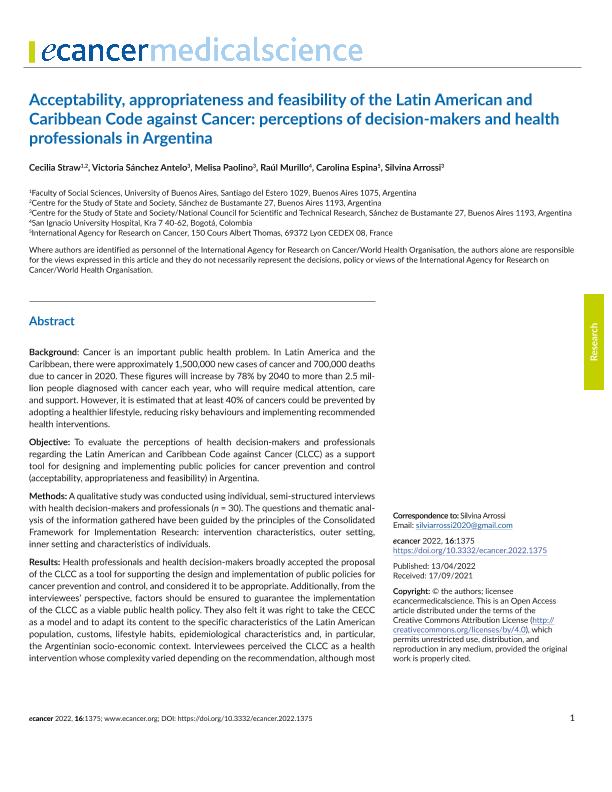Mostrar el registro sencillo del ítem
dc.contributor.author
Straw, Cecilia

dc.contributor.author
Sánchez Antelo, Victoria Inés María

dc.contributor.author
Paolino, Melisa Delia

dc.contributor.author
Murillo, Raúl
dc.contributor.author
Espina, Carolina
dc.contributor.author
Arrossi, Silvina

dc.date.available
2022-07-05T19:11:09Z
dc.date.issued
2022-04
dc.identifier.citation
Straw, Cecilia; Sánchez Antelo, Victoria Inés María; Paolino, Melisa Delia; Murillo, Raúl; Espina, Carolina; et al.; Acceptability, appropriateness and feasibility of the Latin American and Caribbean Code against Cancer: perceptions of decision-makers and health professionals in Argentina; ecancer Global Foundation; ecancermedicalscience; 16; 4-2022; 1-15
dc.identifier.uri
http://hdl.handle.net/11336/161344
dc.description.abstract
Background: Cancer is an important public health problem. In Latin America and the Caribbean, there were approximately 1,500,000 new cases of cancer and 700,000 deaths due to cancer in 2020. These figures will increase by 78% by 2040 to more than 2.5 million people diagnosed with cancer each year, who will require medical attention, care and support. However, it is estimated that at least 40% of cancers could be prevented by adopting a healthier lifestyle, reducing risky behaviours and implementing recommended health interventions. Objective: To evaluate the perceptions of health decision-makers and professionals regarding the Latin American and Caribbean Code against Cancer (CLCC) as a support tool for designing and implementing public policies for cancer prevention and control (acceptability, appropriateness and feasibility) in Argentina. Methods: A qualitative study was conducted using individual, semi-structured interviews with health decision-makers and professionals (n = 30). The questions and thematic analysis of the information gathered have been guided by the principles of the Consolidated Framework for Implementation Research: intervention characteristics, outer setting, inner setting and characteristics of individuals. Results: Health professionals and health decision-makers broadly accepted the proposal of the CLCC as a tool for supporting the design and implementation of public policies for cancer prevention and control, and considered it to be appropriate. Additionally, from the interviewees’ perspective, factors should be ensured to guarantee the implementation of the CLCC as a viable public health policy. They also felt it was right to take the CECC as a model and to adapt its content to the specific characteristics of the Latin American population, customs, lifestyle habits, epidemiological characteristics and, in particular, the Argentinian socio-economic context. Interviewees perceived the CLCC as a health intervention whose complexity varied depending on the recommendation, although most of them were feasible. The broad consensus among the interviewees was that the development of the CLCC could yield numerous advantages in improving cancer prevention and control policy, and responding to the needs of the population. It was also considered to be an opportunity to introduce fundamental changes. With regard to the implementation of the CLCC, interviewees reported a favourable institutional climate, since they perceived that it would receive a priority equal to or greater than the ongoing prevention measures, and that it would have the commitment of the health authorities. They also felt that the implementation of the CLCC in their work environment would not be very complicated, and that the decision-makers and professionals had the necessary capacity to implement it. Finally, they felt that the implementation would be facilitated by the participation and consensus of health decision-makers at the primary care level, and negotiation with industrial and environmental sectors. Conclusions: Our study shows that health professionals and decision-makers consider the CLCC to be highly acceptable, appropriate and feasible. This would facilitate its implementation as a tool that could enhance current cancer prevention and control policies in Argentina. The results of the study indicate the necessity for the CLCC to be adapted to the socio-economic context of Argentina, and highlight that population adherence to the CLCC recommendations will depend on complex and diverse factors, especially those involving changing unhealthy behaviours linked to cancer risk.
dc.format
application/pdf
dc.language.iso
eng
dc.publisher
ecancer Global Foundation
dc.rights
info:eu-repo/semantics/openAccess
dc.rights.uri
https://creativecommons.org/licenses/by/2.5/ar/
dc.subject
CANCER
dc.subject
ACCEPTABILITY
dc.subject
IMPLEMENTATION SCIENCE
dc.subject
PREVENTION
dc.subject
LATIN AMERICAN CODE AGAINST CANCER
dc.subject
ARGENTINA
dc.subject.classification
Otras Ciencias de la Salud

dc.subject.classification
Ciencias de la Salud

dc.subject.classification
CIENCIAS MÉDICAS Y DE LA SALUD

dc.title
Acceptability, appropriateness and feasibility of the Latin American and Caribbean Code against Cancer: perceptions of decision-makers and health professionals in Argentina
dc.type
info:eu-repo/semantics/article
dc.type
info:ar-repo/semantics/artículo
dc.type
info:eu-repo/semantics/publishedVersion
dc.date.updated
2022-06-30T19:01:23Z
dc.identifier.eissn
1754-6605
dc.journal.number
16
dc.journal.pagination
1-15
dc.journal.pais
Reino Unido

dc.journal.ciudad
Bristol
dc.description.fil
Fil: Straw, Cecilia. Universidad de Buenos Aires. Facultad de Ciencias Sociales; Argentina. Centro de Estudio de Estado y Sociedad; Argentina
dc.description.fil
Fil: Sánchez Antelo, Victoria Inés María. Consejo Nacional de Investigaciones Científicas y Técnicas; Argentina. Centro de Estudio de Estado y Sociedad; Argentina
dc.description.fil
Fil: Paolino, Melisa Delia. Consejo Nacional de Investigaciones Científicas y Técnicas; Argentina. Centro de Estudio de Estado y Sociedad; Argentina
dc.description.fil
Fil: Murillo, Raúl. San Ignacio University Hospital; Colombia
dc.description.fil
Fil: Espina, Carolina. Agencia Internacional de Investigación en Cáncer; Francia
dc.description.fil
Fil: Arrossi, Silvina. Consejo Nacional de Investigaciones Científicas y Técnicas; Argentina. Centro de Estudio de Estado y Sociedad; Argentina
dc.journal.title
ecancermedicalscience
dc.relation.alternativeid
info:eu-repo/semantics/altIdentifier/url/https://ecancer.org/en/journal/article/1375-acceptability-appropriateness-and-feasibility-of-the-latin-american-and-caribbean-code-against-cancer-perceptions-of-decision-makers-and-health-professionals-in-argentina
dc.relation.alternativeid
info:eu-repo/semantics/altIdentifier/doi/https://doi.org/10.3332/ecancer.2022.1375
Archivos asociados
